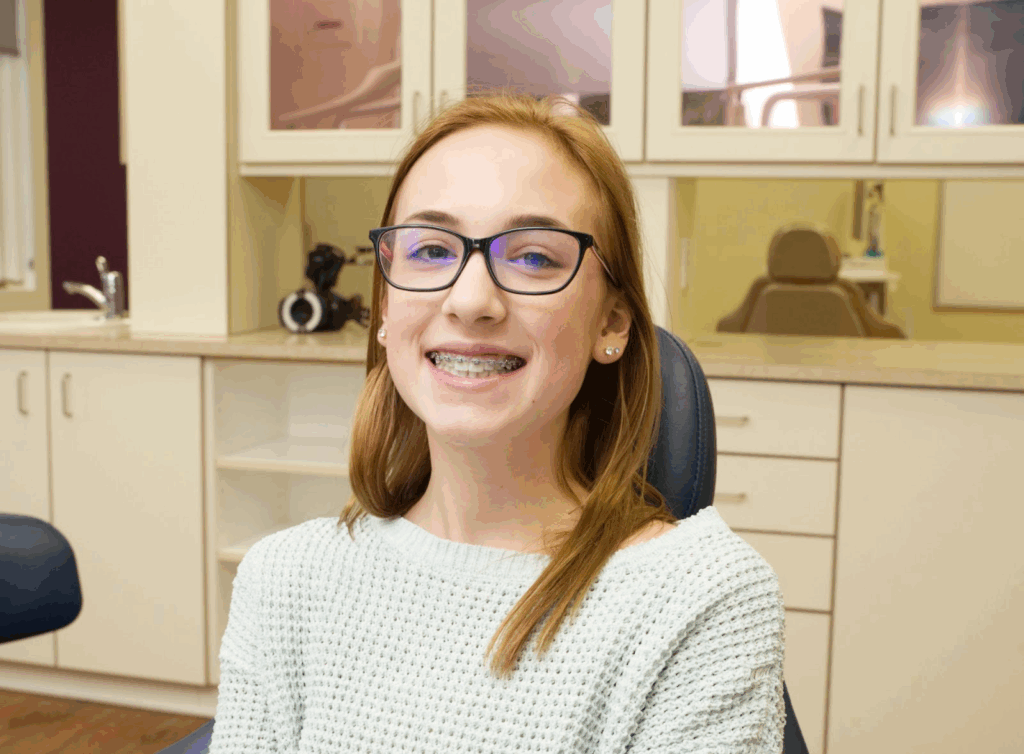Braces are an investment in your smile, and how you care for them can make all the difference in your treatment experience. At Frey Orthodontics, Dr. Dwight Frey and the team work with patients in Naperville and Algonquin to ensure they have the tools, knowledge, and support they need to keep their braces in top shape. Proper care helps you achieve the best results for your smile and can also prevent avoidable delays, discomfort, and emergency visits.
Whether you’ve just started your orthodontic journey or are well into treatment, following these guidelines will help you protect your braces and keep your smile healthy.
Maintaining Oral Hygiene with Braces
Good oral hygiene is the foundation of successful orthodontic treatment. Braces create small spaces where food particles and plaque can collect, making thorough cleaning essential.
Brushing Techniques for Braces
Brushing twice a day isn’t enough when you’re wearing braces. In fact, Dr. Frey recommends brushing after every meal. Use a soft-bristled toothbrush or an orthodontic brush designed for braces, angling the bristles toward the brackets to clean above and below the wires. Take your time to gently but thoroughly brush each tooth surface.
Electric toothbrushes can be especially helpful because they provide consistent motion and pressure, making it easier to reach around brackets and wires. If you’re on the go, carrying a travel toothbrush can help you clean your teeth after eating, even when you’re not at home.
Flossing Around Braces
Flossing with braces can be challenging, but it’s an important step in preventing gum disease and cavities. Floss threaders and orthodontic flossers are designed to help you guide the floss under the wire so you can clean between teeth. Water flossers can also be an effective supplement, flushing out food particles and plaque from around brackets and along the gumline.
Using Interdental Brushes and Rinses
Interdental brushes—small, cone-shaped brushes—are perfect for cleaning between brackets and in tight spaces. Pairing your brushing and flossing routine with an antimicrobial or fluoride rinse can add an extra layer of protection, reducing bacteria and strengthening enamel during treatment.
Eating with Braces
Your diet plays a major role in keeping your braces intact and your teeth healthy.
Foods to Avoid
Sticky, chewy, or hard foods can damage wires and brackets. Dr. Frey advises avoiding items like caramel, taffy, popcorn, nuts, and hard candies. Even healthy snacks like raw carrots and apples should be cut into smaller, bite-sized pieces before eating.
It’s also wise to limit sugary snacks and drinks. Sugar increases the risk of plaque buildup around your brackets, which can lead to white spots on teeth after braces are removed.
Braces-Friendly Alternatives
Fortunately, there are plenty of foods that are safe for braces. Soft fruits like bananas and berries, cooked vegetables, pasta, yogurt, and lean proteins are all good options. Smoothies are another great choice since they’re easy to eat, gentle on your braces, and packed with nutrients.
Navigating Meals Away from Home
When dining out in Naperville, Algonquin, or beyond, keep your braces in mind as you choose from the menu. Opt for softer dishes and avoid anything that requires biting into tough or crunchy foods. Carrying a small kit with a travel toothbrush, floss, and orthodontic wax can help you manage any unexpected issues.

Protecting Braces During Activities
If you’re active in sports or other physical activities, it’s important to protect your braces and teeth from injury.
Mouthguards for Sports
A custom-fit orthodontic mouthguard provides the best protection for athletes with braces. Unlike standard mouthguards, these are designed to fit comfortably over your orthodontic appliances without interfering with tooth movement. Dr. Frey can recommend the right option based on your sport and level of activity.
Managing Accidents or Damage
If you experience a hit to the mouth, check your braces and teeth for any visible damage. Loose brackets, bent wires, or discomfort should be addressed promptly—contact Frey Orthodontics as soon as possible so we can assess and fix the problem. In the meantime, orthodontic wax can be used to cover any sharp edges to prevent irritation.
Dealing with Discomfort
Some soreness is normal, especially after braces are first applied or adjusted.
Relieving Soreness at Home
Over-the-counter pain relievers, used as directed, can help manage temporary discomfort. Cold foods like yogurt, ice cream, or chilled smoothies can also soothe sore spots. For irritation caused by brackets or wires rubbing against your cheeks, orthodontic wax creates a smooth barrier to protect your mouth.
Knowing When to Call the Office
While mild soreness is common, severe or persistent pain should be evaluated by Dr. Frey and the team. Unusual swelling, bleeding, or signs of infection require prompt attention to keep your treatment on track.
Regular Checkups and Communication
Your scheduled visits are essential to your treatment’s success.
Staying on Schedule
Regular adjustments ensure your braces are moving your teeth effectively and safely. Missing appointments can extend your treatment time and may lead to complications.
Speaking Up About Concerns
If you have questions or notice changes in your braces, teeth, or bite between appointments, don’t wait until your next visit. Instead, give us a call at Frey Orthodontics. We’re here to help troubleshoot any issues, from loose wires to questions about your oral care routine.

Caring for Your Braces Leads to Better Results
Braces require commitment, but the payoff of a happy, healthy smile is well worth it. With the right habits, you can keep your treatment on track, avoid setbacks, and enjoy the transformation as it happens.
If you’re in Naperville or Algonquin and have questions about caring for your braces, contact Frey Orthodontics today. Dr. Dwight Frey and our team are ready to guide you every step of the way. With offices in Naperville and Algonquin and free consultations for the whole family, we’re always ready and waiting to help!

